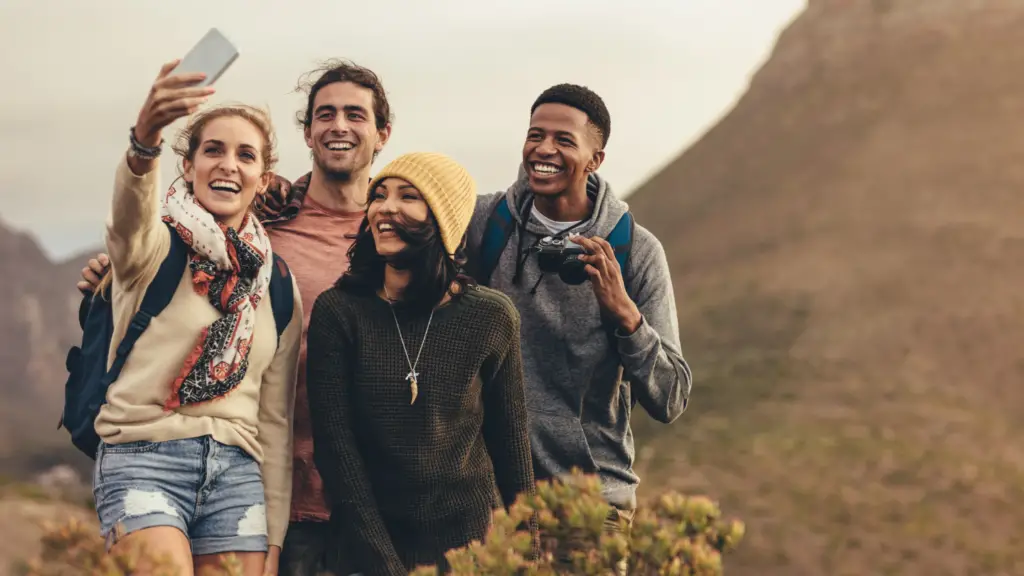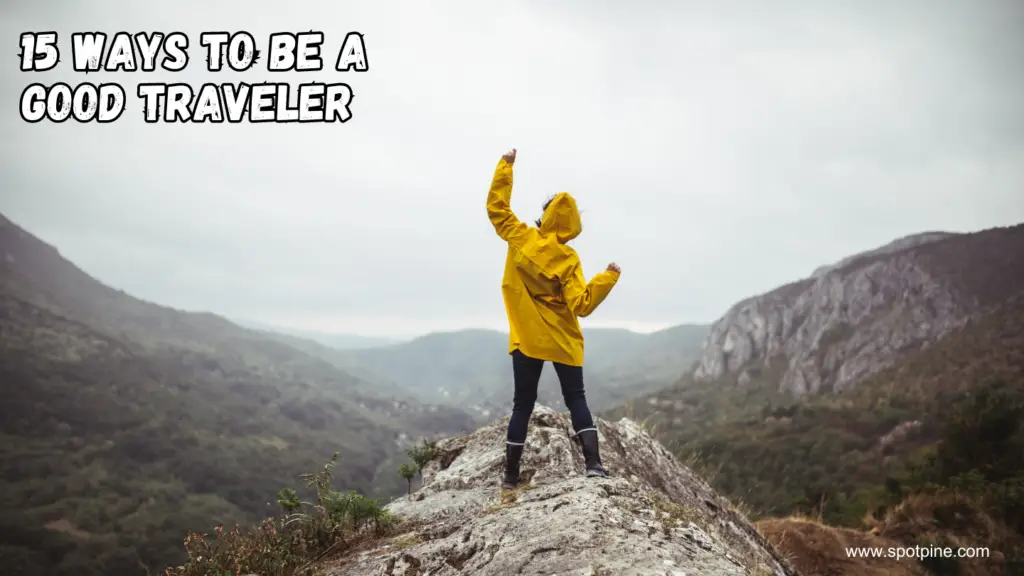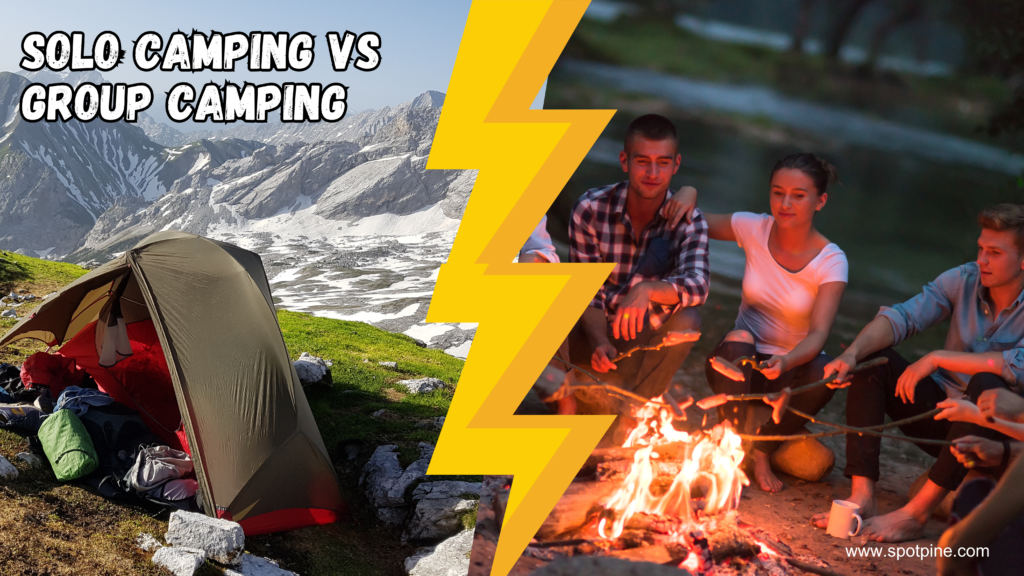Being a good traveler entails being respectful, open-minded, and accountable. It involves traveling with intention, learning about different cultures, and embracing challenges.
Additionally, being a good traveler means showing respect, empathy, and being prepared for the unexpected. This guide aims to provide 15 essential tips that will help you become a better traveler and enhance your overall travel experience. Whether you’re a seasoned globetrotter or a novice explorer, these practical suggestions will empower you to navigate the world with greater awareness and mindfulness.
By incorporating these strategies into your travel ethos, you can contribute to a more positive and fulfilling global travel community while simultaneously enriching your own personal journey.
Cultivating The Right Mindset
Embark on a journey to cultivate the right mindset as a good traveler with these 15 effective tips. From being culturally aware to showing respect and embracing new experiences, each step contributes to a fulfilling travel experience. Happy travels!
Being Open-minded
One key aspect of cultivating the right mindset as a traveler is to be open-minded. Approach your travel experiences with a willingness to embrace new ideas, perspectives, and ways of life. Keep in mind that not everyone thinks or behaves the same way as you do, and that’s okay. By being open-minded, you allow yourself the opportunity to learn and grow from the diverse cultures and people you encounter along your journey.
Being Curious And Adventurous
Another important mindset to adopt as a traveler is curiosity and a sense of adventure. Embrace the unknown and be willing to step out of your comfort zone. Ask questions, seek out new experiences, and go beyond the typical tourist attractions. By cultivating curiosity and a sense of adventure, you’ll be able to fully immerse yourself in the local customs, traditions, and hidden gems of your destination.
Being Culturally Aware
A responsible traveler understands the importance of cultural awareness. Take the time to educate yourself about the history, customs, and traditions of the places you visit. Respect local customs and traditions, and make an effort to interact with locals in a respectful and meaningful way. Remember, you are a guest in their country, and it’s important to show appreciation and respect for their culture.
Being Empathetic
Empathy is a crucial mindset to have as a traveler. Put yourself in the shoes of the locals and try to understand their perspectives. Be mindful of the impact your actions and words may have on others. Treat everyone you meet with kindness and compassion, regardless of their background or circumstances. By being empathetic, you’ll forge deeper connections with the people you encounter and create more meaningful travel experiences.
Being Respectful
Above all, being respectful is essential to being a good traveler. Respect the local culture, customs, and rules of the places you visit. Be mindful of your behavior and how it may be perceived by others. Treat the environment with care and be responsible for your actions. By showing respect to both the people and the places you visit, you contribute to a positive and enriching travel experience for yourself and those around you.
Preparation And Research
Embark on a journey towards becoming a good traveler with thorough preparation and research. Take time to plan your trips, learn about your destination, and embrace new cultures. Preparation and research are key to enriching your travel experiences and fostering a deeper connection with the places you visit.
Planning Ahead
Before embarking on a journey, it’s crucial to plan ahead meticulously. This includes researching the destination, preparing the necessary documents, and booking accommodations and transport.
Learning About The Destination
Prior to traveling, take the time to learn about the destination’s culture, history, and current events. This will provide valuable insights to enhance your overall experience and interactions during the trip.
Learning Basic Phrases In The Local Language
Acquiring basic phrases in the local language demonstrates respect and willingness to engage with the local community. It can also help navigate common situations, such as ordering food or seeking directions.
Understanding Local Customs And Etiquette
Understanding the customs and etiquette of the destination is essential for smooth interactions with locals. It promotes cultural sensitivity and avoids unintentional offense.
Packing Efficiently
Efficient packing involves bringing essential items while minimizing excess baggage. Consider the climate and activities, and aim to pack versatile clothing and necessary accessories to lighten the load.
Sustainable Travel Practices
Traveling sustainably means being a good steward of the environment and local cultures. Consider staying in eco-friendly accommodations, using public transportation, and supporting local businesses. Respect the culture and wildlife, reduce plastic waste, and leave only footprints behind. These simple steps can make a big difference in preserving our planet for future generations.
Minimizing Environmental Impact
When traveling, aim to minimize your environmental impact by choosing eco-friendly transportation options like trains or buses instead of flying.
- Opt for refillable water bottles to reduce plastic waste.
- Follow marked trails and respect wildlife habitats to preserve natural areas.
Supporting Local Communities
Enhance your travel experience by supporting local communities through responsible tourism practices.
- Engage with locals respectfully, understanding and appreciating their cultures.
- Invest in local businesses and artisans to contribute to the community’s economy.
Shopping And Eating Local
Embrace the culture and flavors of your destination by shopping and eating locally.
- Visit farmers’ markets for fresh produce and handmade goods.
- Dine at family-owned restaurants to savor authentic regional dishes.
Choosing Responsible Accommodations
Make a conscious choice by choosing responsible accommodations that prioritize sustainability.
- Look for eco-friendly certifications or practices in hotels and lodges.
- Support accommodations that take steps to reduce waste and conserve energy.
Interacting With Locals
Being a good traveler involves interacting with locals in an authentic and respectful way. By showing curiosity, learning about their culture, and treating them with kindness and respect, you can enhance your travel experience and create meaningful connections with the people you meet along the way.
and daunting at the same time. One of the most crucial aspects of being a good traveler is effectively interacting with locals. This means going beyond the surface level and making a genuine effort to connect, respect their traditions, learn from their perspectives, support local businesses, and abide by social and cultural norms. In this section, we will explore four key aspects of interacting with locals: Making an Effort to Connect, Respecting Local Traditions, Learning from Locals, and Supporting Local Businesses.
Making An Effort To Connect
When traveling to a new destination, it’s important to go beyond being a passive observer. Making an effort to connect with locals allows you to understand their way of life, gain insights into the local culture, and make lasting connections. Start by learning a few basic greetings and common phrases in the local language. This simple gesture shows respect and opens doors for meaningful interactions. Don’t be afraid to strike up conversations with locals, whether it’s asking for recommendations or simply showing interest in their daily lives. Engaging in genuine conversations helps you bridge the cultural divide and fosters a deeper understanding of the destination you’re visiting.
Respecting Local Traditions
Respecting local traditions is essential when interacting with locals. Every culture has its own unique customs and practices, and being aware of and respecting these traditions is crucial for building positive relationships. Take the time to research and understand local customs before your trip. This includes familiarizing yourself with dress codes, religious practices, and social protocols. Avoid behaviors that may be considered disrespectful or offensive, such as inappropriate attire or taking photos without permission. By respecting and embracing local traditions, you show appreciation for the culture and create a more harmonious travel experience.
Learning From Locals
One of the most enriching aspects of traveling is the opportunity to learn from locals. They possess valuable knowledge and insights about their homeland that guidebooks and online resources might not offer. Engage in conversations with locals and listen attentively to their stories and experiences. Ask questions and show genuine curiosity about their way of life, history, and customs. Locals can provide valuable recommendations for off-the-beaten-path attractions, local cuisines, and hidden gems that are not typically found in tourist guides. Embracing their perspectives and acknowledging their expertise will not only enhance your travel experience but also foster cultural exchange and mutual understanding.
Supporting Local Businesses
Supporting local businesses is a key aspect of responsible and sustainable travel. When interacting with locals, make an effort to support their businesses, such as local restaurants, handicraft shops, and family-owned accommodation. By choosing to spend your money in the local economy, you contribute to the economic growth of the community and help preserve their cultural heritage. Seek out local markets and street vendors to experience authentic local flavors and products. Additionally, consider participating in community-based tourism initiatives or volunteering opportunities that directly benefit local communities. By supporting local businesses, you become an active contributor to the well-being of the destination and its people. In conclusion, when interacting with locals, remember to make an effort to connect, respect local traditions, learn from locals, and support local businesses. These actions not only enhance your travel experience but also foster meaningful connections, cultural exchange, and sustainable tourism. By approaching your travels with a mindset of openness, respect, and curiosity, you can truly become a good traveler.

Embracing Challenges And Learning Experiences
Being a good traveler involves embracing challenges and learning experiences. It’s about stepping out of your comfort zone, adapting to unexpected situations, embracing cultural differences, and learning from difficulties to grow as a traveler. Below are some essential aspects to consider:
Stepping Out Of Your Comfort Zone
Exploring new destinations, trying unfamiliar cuisines, and engaging in local activities can help you expand your horizons and gain new perspectives, leading to personal growth and enriching experiences.
Adapting To Unexpected Situations
Expect the unexpected and be flexible in handling unforeseen challenges, such as changes in travel plans or encountering language barriers. Embracing these situations with an open mind can lead to valuable insights and problem-solving skills.
Embracing Cultural Differences
Respecting and appreciating diverse cultures is crucial. Learn about local customs, traditions, and etiquette, and interact with locals in a respectful manner to foster cultural exchange and mutual understanding.
Learning From Difficulties
Instead of seeing obstacles as setbacks, view them as opportunities for learning and growth. Overcoming challenges while traveling can enhance your resilience and adaptability, contributing to personal development.
Growing As A Traveler
Each experience, whether positive or challenging, contributes to your growth as a traveler. Embracing these encounters with an open heart and mind will enable you to become a more culturally aware, empathetic, and skilled explorer.
Being A Responsible Traveler
Being a responsible traveler means taking steps to minimize the negative impact of your travels on the environment and local communities. It’s about being mindful of the choices you make and the actions you take while exploring new places. In this section, we will discuss three key aspects of being a responsible traveler: Reducing Waste and Plastic Usage, Respecting Wildlife and Natural Habitats, and Supporting Local Conservation Efforts.
Reducing Waste And Plastic Usage
One of the most significant ways you can be a responsible traveler is by reducing waste and minimizing plastic usage. Here are some simple but effective ways you can achieve this:
- Carry a reusable water bottle to reduce plastic bottle waste.
- Bring your own reusable shopping bag to avoid the use of single-use plastic bags.
- Avoid using single-use plastic cutlery and instead carry your own reusable utensils.
- Opt for eco-friendly toiletries and avoid using single-use travel-sized products.
- Dispose of waste properly and recycle whenever possible.
Respecting Wildlife And Natural Habitats
Respecting wildlife and their natural habitats is essential for maintaining ecological balance. Follow these guidelines to ensure you are a responsible traveler:
- Observe animals from a safe distance and avoid approaching or touching them.
- Avoid purchasing products made from endangered animals or derived from threatened habitats.
- Stay on designated trails and paths to minimize your impact on fragile ecosystems.
- Do not feed or disturb wildlife, as this can disrupt their natural behavior.
- Learn about the local flora and fauna and support organizations working to protect them.
Supporting Local Conservation Efforts
Supporting local conservation efforts is another vital aspect of being a responsible traveler. Here’s how you can contribute:
- Research and choose accommodations that have environmentally friendly practices and support local initiatives.
- Participate in eco-tourism activities that promote conservation and respect for local cultures.
- Learn about and support local conservation organizations working to protect the natural and cultural heritage of the area you’re visiting.
- Consider volunteering or donating to local community projects that focus on environmental preservation and sustainable development.
- Engage with local communities and respect their customs, traditions, and way of life.
By following these practices, you can make a positive impact on the places you visit while also enhancing your travel experience. Being a responsible traveler not only benefits the environment and local communities but also allows you to develop a deeper connection to the destinations you explore.
Being a good traveler is an ongoing journey of self-awareness and intentionality. It involves embracing and respecting different cultures, traveling with empathy, and making a positive impact. By embodying traits such as open-mindedness, curiosity, and environmental consciousness, you can enhance your travel experiences and contribute to a more harmonious global community.
Practice continuous learning and mindfulness as you navigate the world, fostering meaningful connections and leaving a positive footprint wherever you go.



